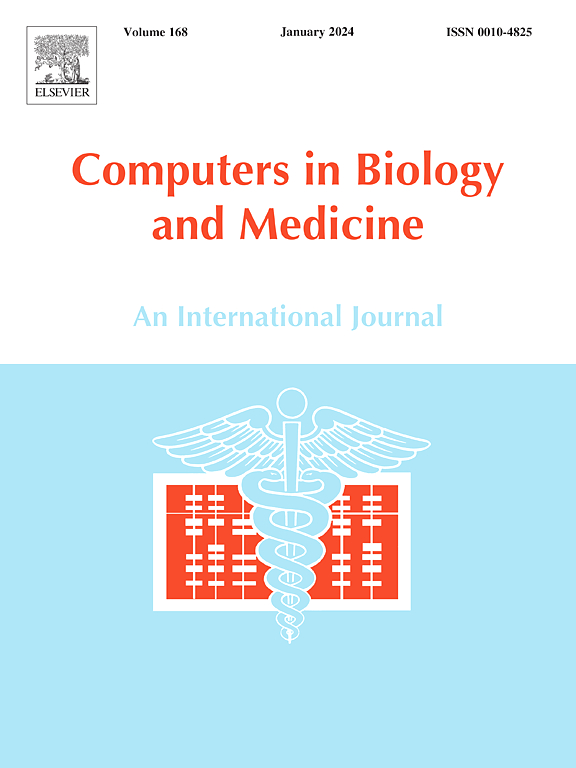从非对比 CT 扫描中对急性缺血性脑卒中病灶进行混合离线和自我知识提炼分割
IF 7
2区 医学
Q1 BIOLOGY
引用次数: 0
摘要
在急性缺血性脑卒中(AIS)发病 0-24 小时内进行诊断和治疗对患者的康复至关重要。虽然弥散加权成像(DWI)和计算机断层扫描灌注成像(CTP)对早期梗死识别很有效,但非对比 CT(NCCT)因其高效性和成本效益仍是急诊环境中的一线成像模式。在这项工作中,为了利用多模态信息增强 NCCT 中的病灶分割,我们提出了 OS-AISeg,它将离线知识提炼与自我知识提炼整合在一起,以实现 AIS 分割。首先,我们通过主观逻辑(SL)理论引入不确定性来训练多模态教师网络,以减少预测误差并稳定训练过程。随后,在学生网络训练过程中,我们整合了以不确定性权重为指导的置信区域知识和以大脑不对称性为指导的特征结构信息。前者有助于从配对预测中获取有效的上下文信息,后者则利用非对称激活图从多模态图像中提取高级结构内容。在自我知识提炼方面,我们通过引入镜像 NCCT 图像来增强学生网络对一致的全局特征分布的学习,从而帮助网络直接从模态中提取知识。OS-AISeg 在两个公开数据集上进行了五倍交叉验证评估,在 AISD 上的 Dice 值为 0.6196,在 ISLES2018 上的 Dice 值为 0.4841。此外,还在一个外部数据集 BraTS2019 和一个名为 GLis 的私有中风数据集上进行了实验。在体积分析中,观察到分割的早期梗死(EI)与地面实况之间存在很强的相关性,验证了所提方法在 AIS 诊断中的有效性。该项目的代码见 https://github.com/Uni-Summer/OS-AISeg。本文章由计算机程序翻译,如有差异,请以英文原文为准。
Hybrid offline and self-knowledge distillation for acute ischemic stroke lesion segmentation from non-contrast CT scans
Diagnosing and treating Acute Ischemic Stroke (AIS) within 0-24 h of onset is critical for patient recovery. While Diffusion-Weighted Imaging (DWI) and Computed Tomography Perfusion (CTP) are effective for early infarction identification, Non-Contrast CT (NCCT) remains the first-line imaging modality in emergency settings due to its efficiency and cost-effectiveness. In this work, to enhance lesion segmentation in NCCT using multi-modal information, we propose OS-AISeg, which integrates Offline knowledge distillation with Self-knowledge distillation to realize AIS segmentation. Initially, we trained a multi-modality teacher network by introducing uncertainty through Subjective Logic (SL) theory to reduce prediction errors and stabilize the training process. Subsequently, during student network training, we integrate confidence region knowledge guided by uncertainty weights and feature structure information guided by brain asymmetry. The former facilitates the acquisition of effective contextual information from paired predictions, while the latter leverages asymmetric activation maps to extract high-level structural content from multi-modality images. In self-knowledge distillation, we enhance the student network’s learning of consistent global feature distributions by introducing mirrored NCCT images, thereby aiding the network in extracting knowledge directly from the modality. OS-AISeg was evaluated through five-fold cross-validation on two publicly available datasets, achieving a Dice value of 0.6196 on AISD and 0.4841 on ISLES2018. Additionally, experiments were also conducted on an external dataset, BraTS2019, as well as on a private stroke dataset named GLis. Strong correlations were observed between segmented Early Infarct (EI) and ground truth in volume analysis, validating the effectiveness of the proposed method in AIS diagnosis. The code for this project is available at https://github.com/Uni-Summer/OS-AISeg.
求助全文
通过发布文献求助,成功后即可免费获取论文全文。
去求助
来源期刊

Computers in biology and medicine
工程技术-工程:生物医学
CiteScore
11.70
自引率
10.40%
发文量
1086
审稿时长
74 days
期刊介绍:
Computers in Biology and Medicine is an international forum for sharing groundbreaking advancements in the use of computers in bioscience and medicine. This journal serves as a medium for communicating essential research, instruction, ideas, and information regarding the rapidly evolving field of computer applications in these domains. By encouraging the exchange of knowledge, we aim to facilitate progress and innovation in the utilization of computers in biology and medicine.
 求助内容:
求助内容: 应助结果提醒方式:
应助结果提醒方式:


